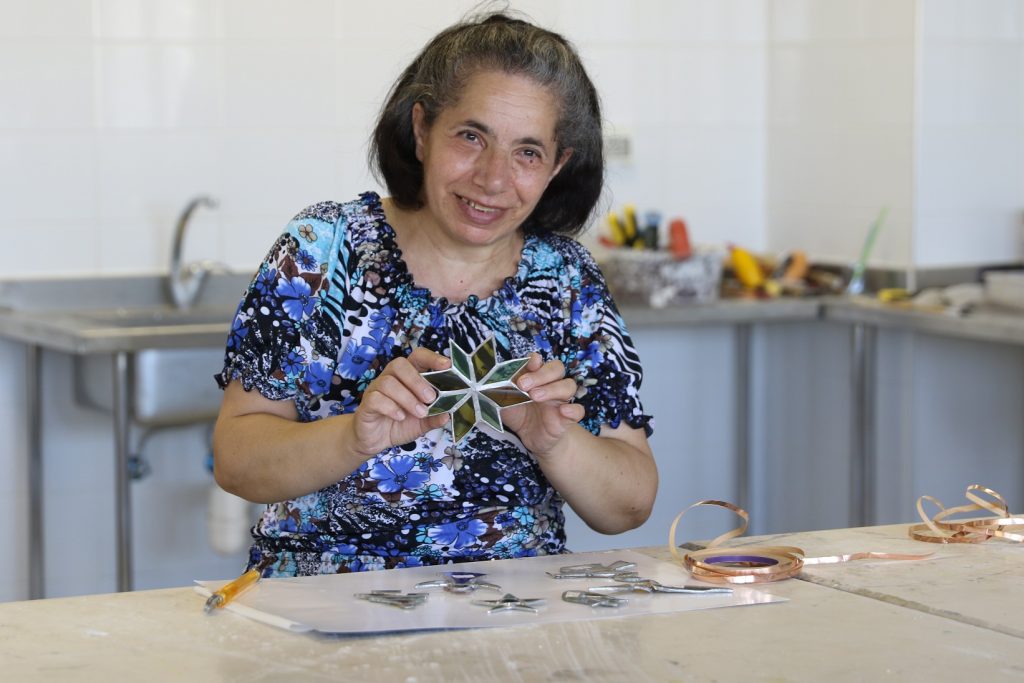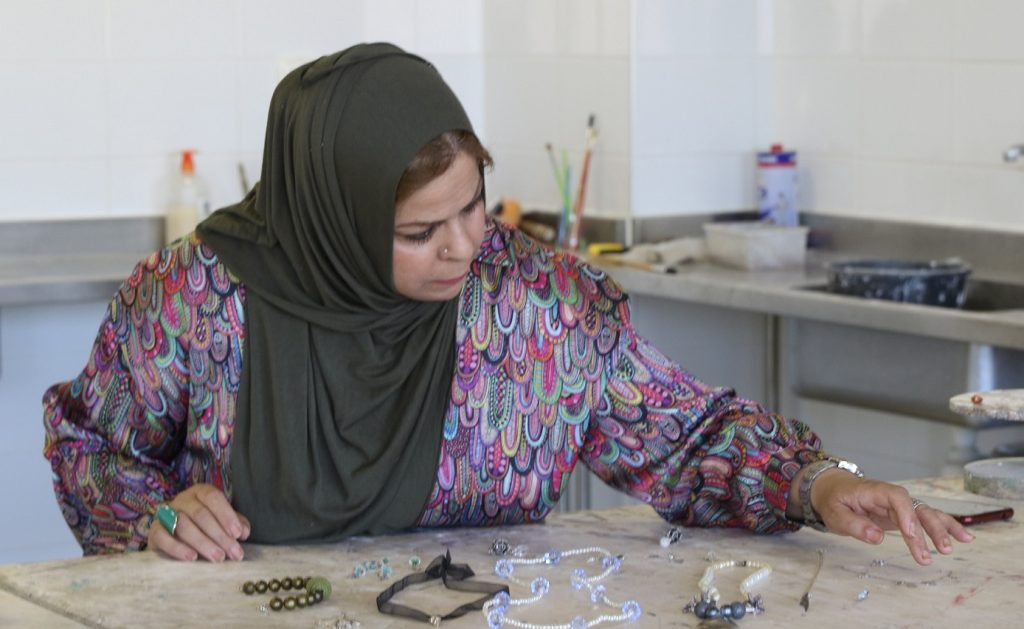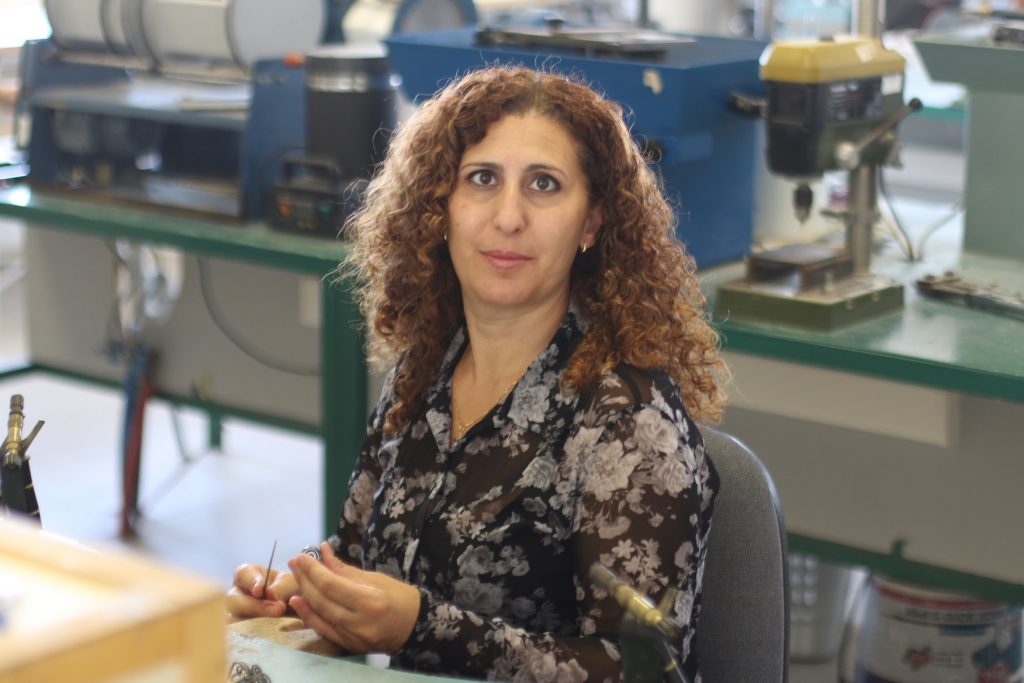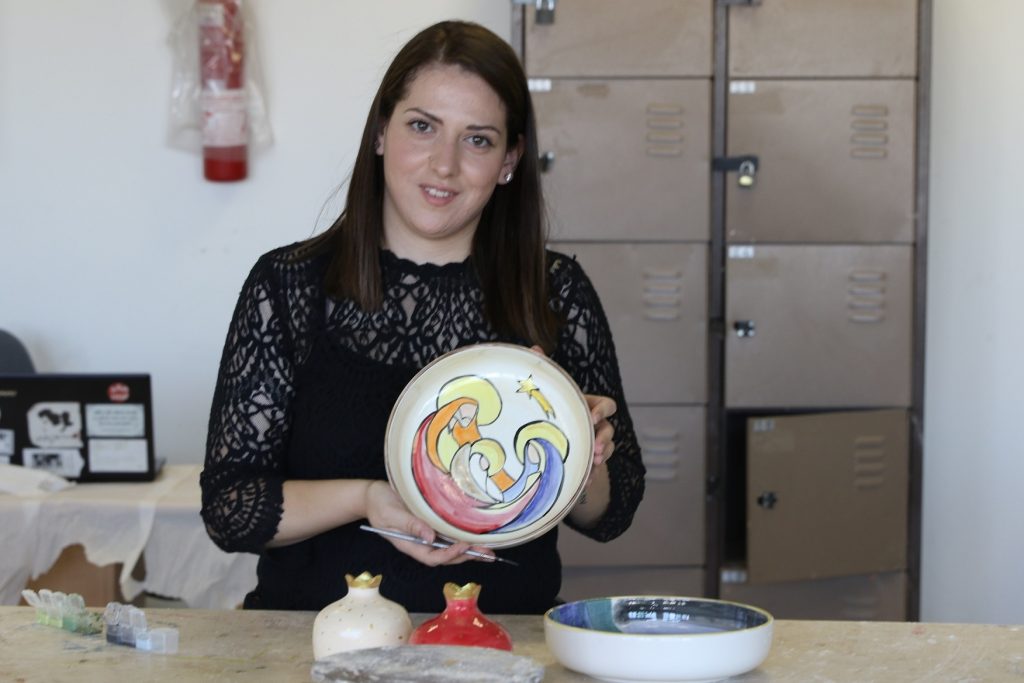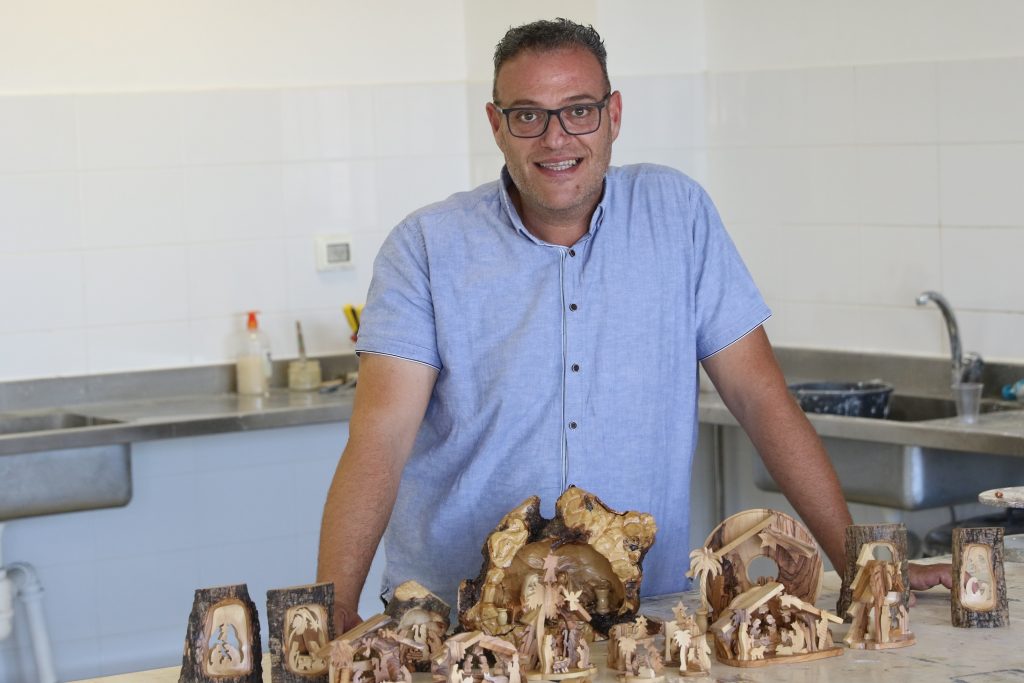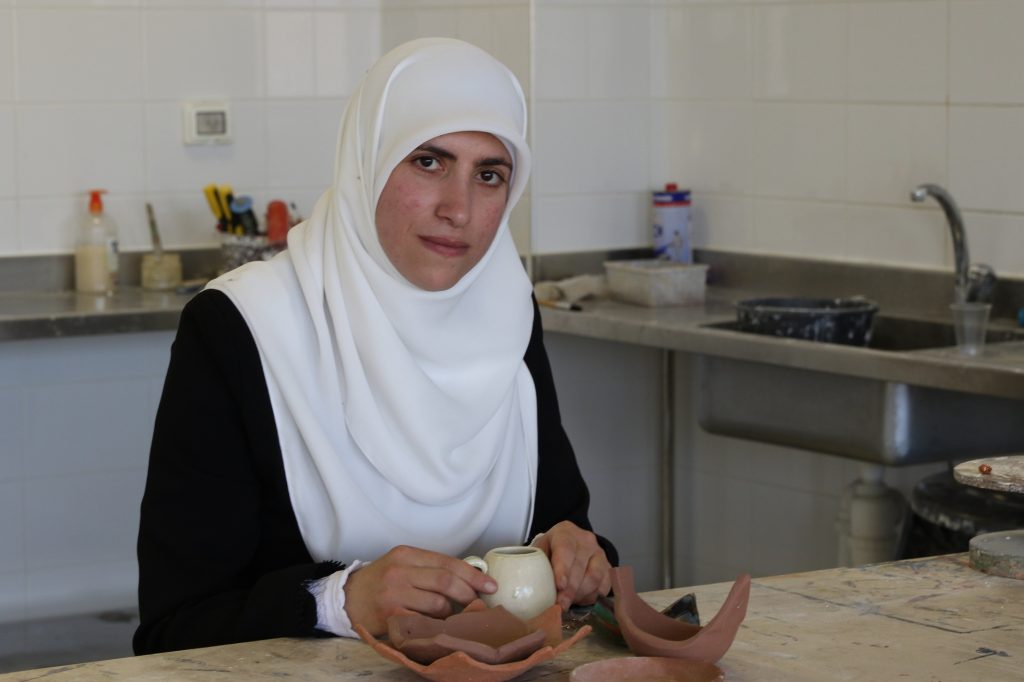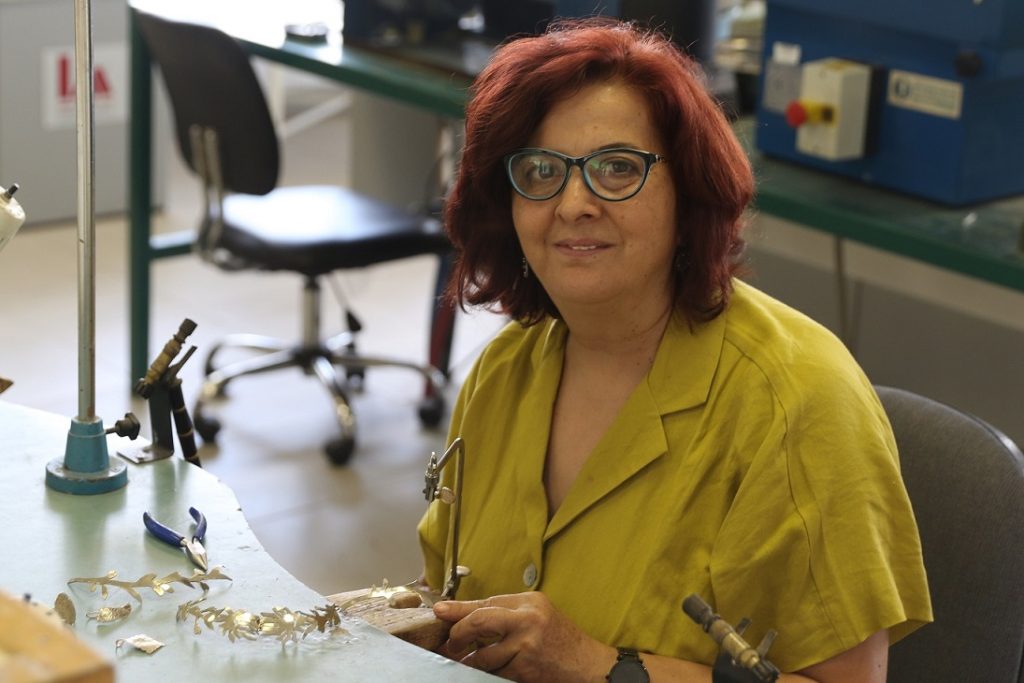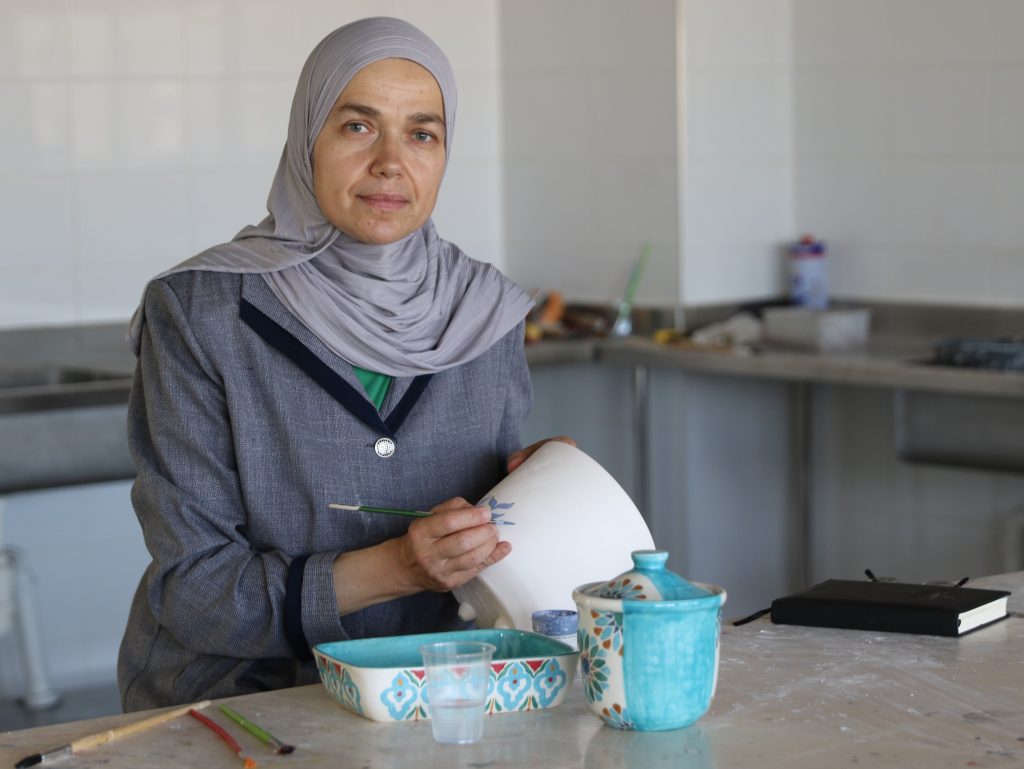Islam Fannoun (اسلام فنون)
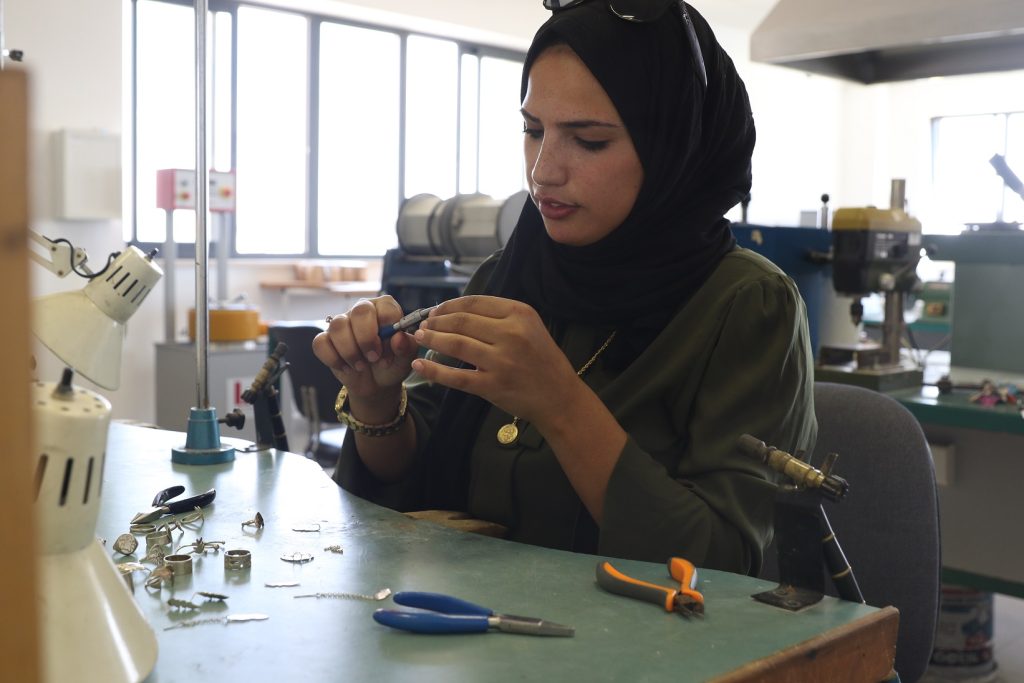
Islam Fannoun
Islam Fannoun, from Nahalin village, southwest of Bethlehem, graduated in 2019 from Dar Al-Kalima College with an associate diploma in metalworking.
After graduating from high school, she started doing Business Administration at Al-Quds Open University, Bethlehem. Two years later, she decided to quit the program, which didn’t fulfil her artistic passion since she had been crafting accessories for years when she was still in school. Then, she enrolled in the metalworking program in Dar al-Kalima, after much effort in convincing her family with this speciality.
Islam proved her talent and accuracy in the field and partnered with some colleagues to establish a silversmithing workshop called “Etkan”. The workshop was running for several years before they were forced to close it due to the financial challenges during the Coronavirus pandemic. In previous years, Islam sold her products at Dar Annadwa gift shop and participated in annual bazaars and local handicrafts markets.
Like other artisans, Islam struggles with marketing, especially after the pandemic, considering the complete absence of tourism in her home city, Bethlehem. She noted that foreigners and tourists are the main categories of customers. Islam explained that most local artisans are very professional and talented in making their handicrafts but need administrative and marketing support to reach international customers who appreciate their creativity and are willing to buy handmade silver products.
She worked in several local jewellery-making workshops, which helped her gain practical experience and knowledge in the market to explore sources of raw material, design, production, and pricing techniques
Islam participated in a business incubator run by the German Corporation for International Cooperation (GIZ) and started her independent “Land and Stone” project. Lately, she has been trying to adapt her work to enter the local market. For example, Islam makes customized silver gifts to please the local customer. She makes necklaces, rings, piercings and bracelets. In her products, Islam combines silver with gemstones that tourists love and appreciate, like turquoise stones.
She runs her business Facebook page to promote her products and reach a wider circle of local customers. She constantly tries to participate in local exhibitions and believes that by doing so, she promotes herself as an independent artisan and market her products.
إسلام فنون
اسلام فنون من قرية نحالين، غرب بيت لحم تخرجت عام 2019 من برنامج صياغة المجوهرات في كلية دار الكلمة.
بعد تخرجها من الثانوية العامة التحقت بجامعة القدس المفتوحة، في بيت لحم في برنامج بكالوريوس إدارة الاعمال، وبعد سنتين انسحبت من البرنامج الذي لم تجد نفسها فيه ولم يلبي شغفها في التعلم وخاصة أنها تمارس هواية صياغة الاكسسوارات منذ عمرٍ مبكر أيام المدرسة. هنا سجلت في كلية دار الكلمة والتحقت في برنامج صياغة المجوهرات بعد مجهودٍ كبير في اقناع عائلتها بهذا التخصص واحتراف هذه المهنة.
أبدعت إسلام في تخصصها وأسست بالشراكة مع مجموعة من زميلات المهنة مشغلاً يختص بصياغة المجوهرات الفضية والذي حمل اسم “إتقان”. عمل المشغل لعدة سنوات قبل أن يضطروا لإغلاقه نتيجة التحديات المالية التي واجهتهم خلال جائحة كورونا. في السنوات السابقة، كانت تعتمد إسلام على بيع منتجاتها في متجر دار الندوة الدولية والمشاركة في البازارات السنوية والأسواق المحلية المختصة بمنتجات الحرفيين.
كغيرها من الحرفيين، تعاني إسلام من مسألة التسويق وخاصة ما بعد الجائحة في ظل غياب السياحة بشكل كلي عن مدينة بيت لحم التي تسكن فيها، وهي الشريحة الأكثر اهتماماً وتقديراً لمجوهرات الفضة. تؤكد إسلام أن ما يحتاجه أصحاب الحرف هو الدعم الإداري والتسويقي للمنتجات على المستوى الخارجي، حيث ترى أن سوق المجوهرات الفضية يدوية الصنع لا يجد تقديراً في السوق المحلي وإنما يبحث عنه الأجانب والسياح.
عملت في عدة مشاغل محلية لصياغة المجوهرات، مما ساعدها في اكتساب الخبرة العملية والمعرفية في تفاصيل السوق المتعلقة بمصادر المواد الخام، تقنيات التصميم والتنفيذ والتسعير وغيرها.
شاركت إسلام في إحدى حاضنات الأعمال التي تنفذها المؤسسة الألمانية للتعاون الدولي وبدأت مشروعها الشخصي المستقل تحت اسم “أرض وحجر”. وتعمل حالياً بعدتها البسيطة في منزلها وتطمح لإعادة تأسيس مشغلها الخاص من جديد بشكل مستقل. تقوم بتصميم وتنفيذ المجوهرات الفضية والتي تلقى رواجاً في السوق المحلي كتصميم التعليقات الفضية على شكل أسماء على حسب طلب الزبائن، الأساور والميداليات والسناسيل وحلاق الأذنين وغيرها. في مجوهراتها، تدمج إسلام بين الفضة والأحجار الكريمة التي يعشقها السياح كحجر الفيروز.
لديها صفحة على موقع الفيسبوك وتحاول من خلالها الترويج لمنتجاتها والوصول إلى شريحة من الزبائن المحليين. تحاول المشاركة باستمرار في المعارض المحلية وتؤمن بأهمية هذه المشاركات في الترويج لها ولمنتجاتها.

